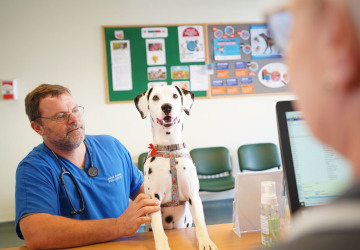
Poisonous plants to keep away from cats at Christmas
November 7, 2019
We all know how much cats love a bauble and many a Christmas tree has fallen prey to their climbing antics. But for all the amusement decorations can bring, some festive foliage can actually be dangerous to cats.
The following list of plants to look out for has been put together by Edgewood Vets team to help you keep your pet safe this Christmas. If you are uncertain about any of your decorations, or are worried your cat may have eaten any of the following, please don’t hesitate to contact us.
Contact us for advice or emergency care
What plants should you look out for this season?
Poinsettia. The brightly coloured leaves of this plant contain a sap that is irritating to the tissues of the mouth and oesophagus. If your cat ingests them, it is likely to suffer nausea and vomiting. The plant would only cause poisoning if large amounts are ingested, which is unlikely due to the irritation. But it’s still best to keep your cats away from these plants.
Holly. This is another plant we see a lot of during the festive season, but it’s best kept away from your cat. The leaves and berries are toxic and if ingested will cause severe intestinal upset, resulting in vomiting and diarrhoea.
Mistletoe. While this is generally hung from the ceiling, it’s best to make absolutely sure it’s kept out your cat’s reach at all times. If the leaves or berries are accidentally ingested, they can cause mild signs of digestive irritation, such as drooling, vomiting and abdominal pain. Large amounts can lead to more severe issues, including low blood pressure, abnormal heart rate, collapse and even seizures.
Christmas tree. The oils produced by fir trees can cause irritation to your cat’s mouth and stomach, leading to excessive drooling or vomiting. The needles alone can cause great pain to your cat if eaten. You should also keep cats away from any water your Christmas tree is sitting in – bacteria, mould and fertilisers from the tree can make them very sick.
Obviously, your cat is far more likely to be interested in the wrapping paper and boxes, but if you think your cat has ingested any of these plants, make sure you contact our head nurse Caroline immediately.






